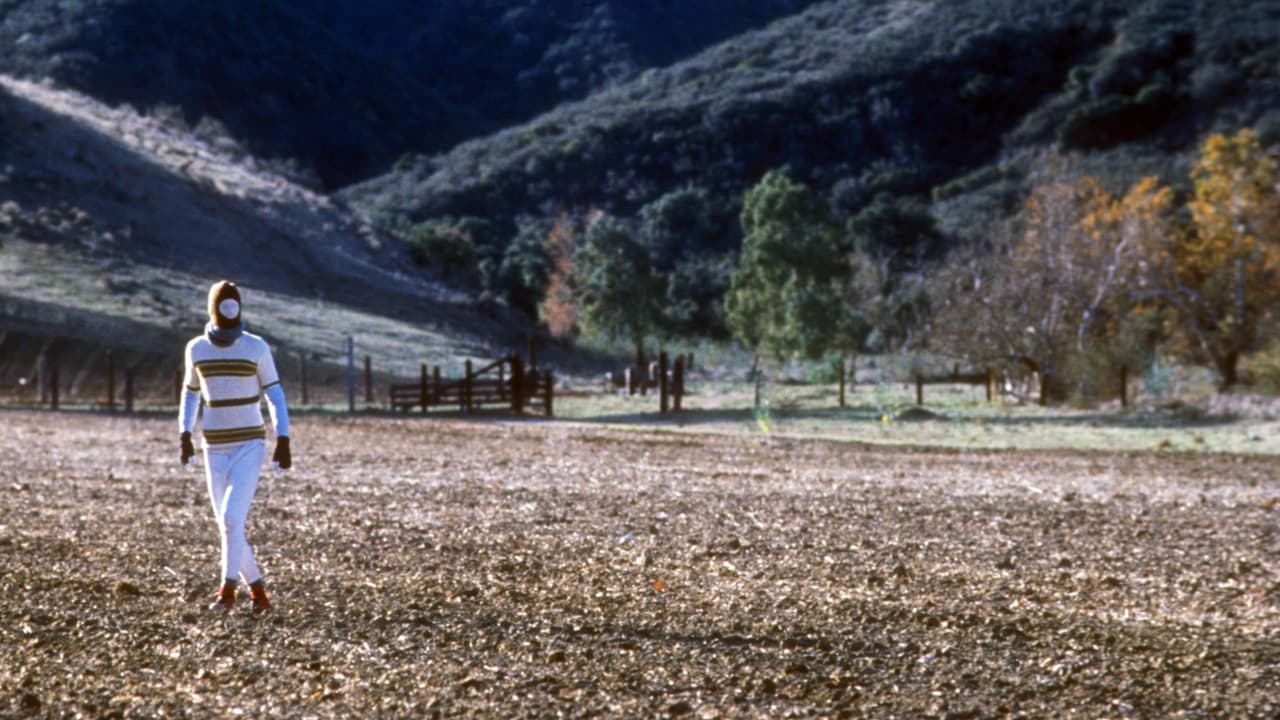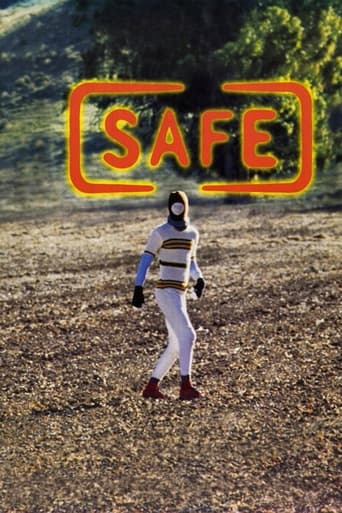

This is a must-see and one of the best documentaries - and films - of this year.
... View MoreIt really made me laugh, but for some moments I was tearing up because I could relate so much.
... View MoreThe storyline feels a little thin and moth-eaten in parts but this sequel is plenty of fun.
... View MoreWorth seeing just to witness how winsome it is.
... View MoreSafe is about Carol, a woman struggling with her hollow existence as a wealthy suburban housewife. Although the movie, which was made in 1995, is set in 1987, there doesn't appear to be any significance to this. The central concern of the film is Carol's mysterious, possibly psychosomatic illness, which serves as a wonderfully ambiguous metaphor for her emotional and intellectual malaise; nobody, including Carol, can quite put her finger on what's wrong. She just knows that something isn't right.While "best film of the decade" is a fairly ludicrous pronouncement (does anyone really think Safe is better than, for example, Schindler's List?), the film is indeed a hauntingly beautiful portrait of spiritual bankruptcy in contemporary America. Despite this, I found that Safe was, perhaps intentionally, itself hollow at the core. It simply didn't have anything interesting to say about such a big, important topic. One could argue that it is not the job of the film to supply answers or even an easily-digestible plot, but the almost complete lack of narrative drive, dramatic tension, and penetrating insight ultimately left me cold, and quite honestly, bored stiff. By contrast, American Beauty (1999), a roughly contemporaneous film with a roughly similar subject, also has nothing to say, but at least does so in an entertaining, over-the-top style.The latter half of the film depicts Carol's experiences at a New Age retreat called Wrenwood, where she attempts to find the solutions to her problems. Unlike many viewers, I did not interpret Wrenwood as a cure that is worse than the disease. In fact, almost everything said by the guru Peter and his underlings is, as far as I can tell, consistent with widely-accepted, scientifically-validated ideas, such as Mindfulness. The exception is some of the more questionable statements about and practices surrounding "chemicals" and the immune system, but nothing remotely equivalent to "psychological fascism," which is how one high profile review of Safe termed it.At any rate, the movie does seem to imply that life at Wrenwood for Carol is as empty as life in the suburbs, and her condition does not appear to improve. Particularly painful to watch, due in no small part to Julianne Moore's flawless performance, is a birthday scene at Wrenwood that serves as a climax of sorts. In that scene, Carol struggles to articulate the beliefs of the cabal, with the words as hollow as those in discussions with her vapid friends back in suburbia. The final shot in Safe, reminiscent of the final shot in The Graduate (1967), is a masterpiece of ambiguity, perhaps implying there is hope for Carol if she can find it within herself, but then again, maybe not.I can't help but notice the similarities of Carol's journey to that of the protagonist in Hermann Hesse's classic novel Siddhartha. The protagonist in the book feels empty, tries various means to fill the void, including materialism and organized religion, and eventually finds peace through the hard-won development of a very personal perspective on himself, his life, and his place in the universe. By analogy, the plot in Safe would be like the novel's plot if it followed the protagonist through his life until it simply stopped in the middle of another failed attempt at finding meaning. It's certainly a journey, and perhaps a realistic one. However, it would be deeply unsatisfying, and would make me question the value in even reading the book in the first place. That's how Safe felt to me. Perhaps there is great value is simply calling attention to the issues, depicting the toll it takes on a woman, and doing so with compassion, honesty, and artistic skill. On that level, Safe certainly succeeds.
... View MoreSeems like Todd Haynes is definitely a director with a certain skill for visualizing and really executing certain themes and ideas in ways that, if not entirely original, are surely very unique in their presentation. This film, like many have said, could really stand for a lot of different things (AIDS being the most obvious one) but it's definitely concerned with those types of ambiguities and metaphors that serve another type of resonance. The acting is fantastic, Moore actually giving one of the best performances from her entire career (shame it's such an underrated/underseen flick because I could see it having been a lot more popular). The film as a whole is very well developed.
... View MoreOne of the most important figures of modern independent American cinema, Todd Haynes is widely known mostly for his music-based projects ( ''Velvet Goldmine'', ''I'm not there'', ''Superstar : the Karen Carpenter story'' and the videoclip for Sonic Youth's ''Disappearer'' ). But it's 1995's ''Safe'' that, although not related to music ( except for the amazing soundtrack ), stands out as his greatest work by far - and that is because it proves once more something that seems paradox at first glance : that the most ''anti-American'' culture that we've known so far, is the American culture itself.Carol White ( Julianne Moore in the greatest moment of her multifarious career ) is a bourgeois housewife that leads a peaceful and safe ( motif that obviously repeats itself several times throughout the film ) life with her husband and her adopted son in their luxurious house. Her daily routine is limited to aerobic classes, choosing the right color for the new sofa and having healthy meals with the rest of the good housewives - her friends. While the story unfolds she goes through some crises that look like epileptic and she starts believing more and more that its due to the effects of the environmental disaster, like the infected air she breathes in the city, or the chemical products she consumes on daily basis - and that's enough with the synopsis cause I already gave away a lot.Judging from all the above, someone would imagine that this is just a film with eco-friendly messages and indeed, this is the impression that the viewer gets around halfway through the film. Sure, the emotional emptiness of her family routine and her materialistic way of life has been made clear so far, but until then her emotional crisis doesn't seem to connect to the environmental crisis in any convincing way. The viewer is trying to connect the pieces, completely unsuspected about what's coming up next - and be sure that it's going to shake and flutter you like few other movies do.The ideology that dominates the world right now, not only in the US of course but globally, has too many aspects and the environmental crisis is only a small part of its effects in the social life - also in the film, it's going to be proved that the ecological extension is just an excuse. What really matters here is the basis upon which this ideology is build, meaning everything that feeds it and promotes on a daily basis ''from below'' : the path of individualism and family alienation from society create the need for safety from everything that threats to shake the peaceful life of the proud ''civilian'' - and that's exactly what Carol is. A low-profile, exemplary, law-abiding citizen that minds her own business and that once in a while ''breaks'' the routine by drinking tea with lemon at her friends' or trying a perm for a change. However, she's completely helpless fulfilling her need for emotional contact and, in what seems a huge step for her from what we've known so far, she decides to change her way of life drastically. Convinced that the root of all her problems is the exhaust gas of the big city, she cages herself in an even more limited environment, a strictly closed society that promises peace and serenity to her. ''We are safe, and all is well in our world'' teaches the new ''alternative'' mentor and he warns her that she is the sole responsible for everything that spoils her peace - and that is because ''she doesn't love herself too much''. Carol is willing to believe anything to find a cure, but her new cage is as deadlock as the previous one, only this time human contact is restricted by rules. The shockingly ironic last scene still haunts me every time I walk alone in the dark.
... View MoreTodd Haynes' Safe starts off as the chronicle of the life of a bourgeois housewife from the 1980s. She seems a bit repressed by her frequently overbearing husband and her interactions with others never progress beyond rote banalities. She has no personality to speak of, in fact she seems almost incapable of acting of her own accord. Eventually she develops an illness which is so foreign to her doctor that he suggests a psychiatrist. It seems that she has grown so dissatisfied with her empty life at a subconscious level that she begins to physically manifest this dissatisfaction.The woman begins to search for a way to overcome her new condition, or at the very least to find some way to explain it. She eventually falls in with a group of people who claim to be sick due to an inability to cope with the chemicals that the modern lifestyle has released into the environment. Her condition worsens as she heads to an isolated commune where other rich people with equally enigmatic maladies gather to convalesce. This commune is led by an incredibly wealthy man who claims to be terminally ill and explains that the only way for his clients to improve their condition is to learn to love themselves.The film doesn't take a stance as to whether the protagonist's condition is caused by her physical environment or her lack of mental stimulation. It is critical of the society that claims to have all the answers for her, however, as everybody she encounters seems to have a plan to heal her but they succeed only in worsening her condition and decreasing the size of her living space. Haynes milks the ambiguity of the situation for his unusual narrative as his languid pace calls to mind the work of Michelangelo Antonioni, that Italian poet of ennui. Although Haynes does an adequate job technically and even manages to create some memorable images, he never manages to capture the zeitgeist the way Antonioni's best work did, nor does he combine that well worn style with any unique personal touches the way other Antonioni-influenced auteurs such as Wong Kar-Wai or Tsai Ming-liang did at around the same time. Safe manages to make its points fairly well in spite of its lack of originality and the sense of narrative bloat toward the end, making it a decent but non-essential film.
... View More